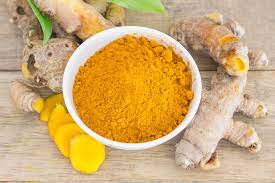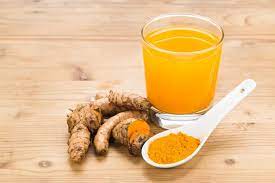



Turmeric is a spice that has been used for thousands of years for its medicinal properties, as well as its culinary uses. Turmeric is a bright yellow-orange spice that is commonly used in Indian, Middle Eastern, and Southeast Asian cuisine. Turmeric has a long history of use in traditional medicine, and recent scientific research has also shown that it has many health benefits.
One of the active ingredients in turmeric is curcumin, which has anti-inflammatory properties. Inflammation is a natural response of the body to injury or infection, but chronic inflammation can contribute to a number of health problems, including heart disease, cancer, and Alzheimer’s disease. Curcumin has been shown to inhibit the activity of certain enzymes that cause inflammation, and some studies have suggested that it may be as effective as some anti-inflammatory drugs.
Turmeric has also been shown to have antioxidant properties, meaning that it can help protect the body against damage from free radicals, which are unstable molecules that can damage cells and contribute to aging and disease. Studies have suggested that curcumin may help protect against certain types of cancer by reducing oxidative stress and inflammation.
In addition to its anti-inflammatory and antioxidant properties, turmeric has been shown to have other health benefits as well. Some studies have suggested that it may help improve brain function, including memory and attention span, and may even help reduce the risk of Alzheimer’s disease. It may also help reduce the risk of heart disease by improving the function of the endothelium, which is the lining of the blood vessels.
Turmeric is also commonly used as a natural remedy for a number of ailments. It is often used to treat digestive problems, such as bloating and gas, and may even help reduce the symptoms of irritable bowel syndrome (IBS). It may also help relieve pain and inflammation in conditions such as arthritis and may even help lower cholesterol levels.
Turmeric can be consumed in a number of ways, including as a spice in cooking, as a supplement, or as a tea. When using turmeric as a spice, it is often paired with black pepper, which can increase the absorption of curcumin in the body. Turmeric supplements are available in capsule form and can be taken daily as a dietary supplement. Turmeric tea can be made by boiling water and adding a teaspoon of turmeric powder, along with other spices or sweeteners as desired.
Health Benefits
- Anti-inflammatory properties
One of the most well-known benefits of turmeric is its anti-inflammatory properties. Inflammation is a natural response of the body to injury or infection, but chronic inflammation can contribute to many health problems, including heart disease, cancer, and Alzheimer’s disease. Curcumin has been shown to inhibit the activity of certain enzymes that cause inflammation, and some studies have suggested that it may be as effective as some anti-inflammatory drugs.
- Antioxidant properties
Turmeric also has antioxidant properties, which means that it can help protect the body against damage from free radicals, which are unstable molecules that can damage cells and contribute to aging and disease. Studies have suggested that curcumin may help protect against certain types of cancer by reducing oxidative stress and inflammation.
- Improved brain function
Studies have suggested that turmeric may help improve brain function, including memory and attention span, and may even help reduce the risk of Alzheimer’s disease. Curcumin has been shown to increase the levels of a growth hormone called brain-derived neurotropic factor (BDNF), which is involved in the formation of new neural connections in the brain.
- Reduced risk of heart disease
Turmeric also helps reduce the risk of heart disease by improving the function of the endothelium, which is the lining of the blood vessels. Endothelial dysfunction is a key factor in the development of heart disease, and studies have suggested that curcumin can improve endothelial function as effectively as exercise.
- Digestive health
Turmeric is often used to treat digestive problems, such as bloating and gas, and may even help reduce the symptoms of irritable bowel syndrome (IBS). It may also help relieve stomach ulcers and prevent the growth of H. pylori bacteria, which can cause stomach ulcers.
- Joint health
Turmeric is also be beneficial for joint health, as it has anti-inflammatory properties that may help reduce pain and swelling associated with conditions such as osteoarthritis and rheumatoid arthritis. - Fights Acne Due to its antibacterial properties, turmeric can help prevent acne by killing off the bacteria that cause it. It also helps to reduce inflammation, which can further reduce the likelihood of breakouts.
- Brightens the complexion Turmeric is a natural skin brightener that can help reduce the appearance of dark spots and hyperpigmentation. It works by inhibiting the production of melanin, which is responsible for skin pigmentation.
- Improves skin texture Turmeric can also help improve the texture of the skin by promoting collagen production. Collagen is an essential protein that helps keep the skin looking firm and youthful.
- Soothes dry skin Turmeric can help soothe and moisturize dry skin by promoting the production of natural oils. It also has emollient properties that can help soften and smooth rough, dry skin.
- Slows down aging Turmeric is a potent antioxidant that can help protect the skin against free radical damage, which is a major contributor to premature aging. It can also help promote cell regeneration and slow down the formation of wrinkles and fine lines.
Turmeric can be consumed in a number of ways, including as a spice in cooking, as a supplement, or as a tea. When using turmeric as a spice, it is often paired with black pepper, which can increase the absorption of curcumin in the body. Turmeric supplements are available in capsule form and can be taken daily as a dietary supplement. Turmeric tea can be made by boiling water and adding a teaspoon of turmeric powder, along with other spices or sweeteners as desired.
Conclusion:
Turmeric is a versatile spice that has many potential health benefits. While more research is needed to fully understand its effects, current studies suggest that it may be an effective natural remedy for a wide range of health conditions, as well as a useful dietary supplement for overall health and well-being. While turmeric is generally considered safe when consumed in moderate amounts, it may interact with certain medications, such as blood thinners, and should be used with caution in these cases. It is also important to note that turmeric supplements may contain high amounts of curcumin, which can cause side effects such as nausea and diarrhea in some people.
